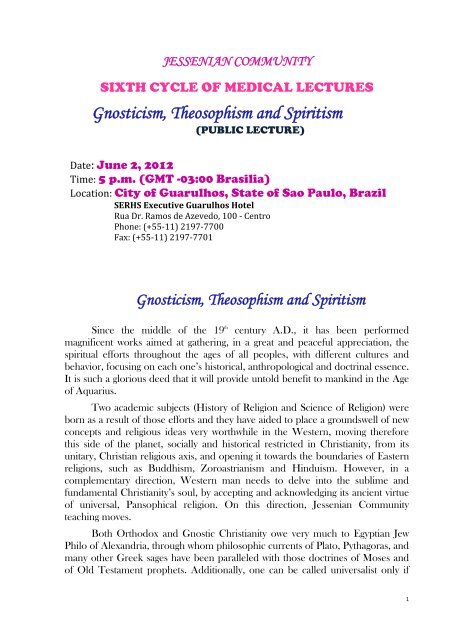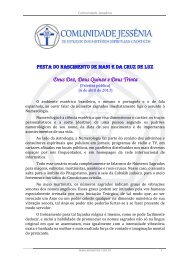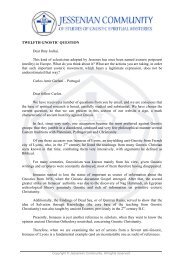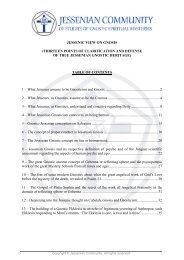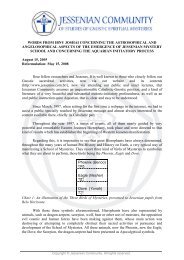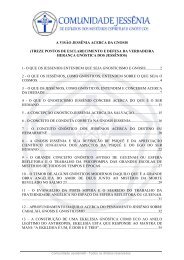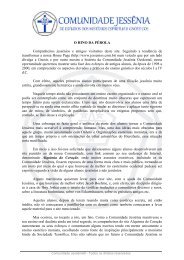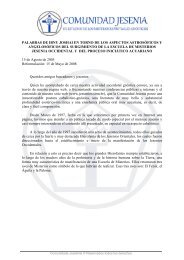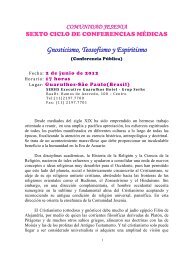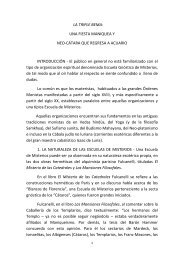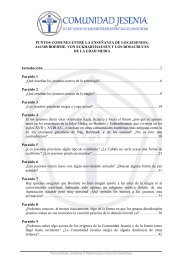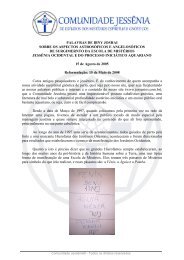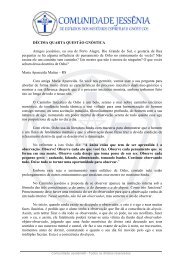Gnosticism, Theosophism and Spiritism - Comunidade Jessênia
Gnosticism, Theosophism and Spiritism - Comunidade Jessênia
Gnosticism, Theosophism and Spiritism - Comunidade Jessênia
Create successful ePaper yourself
Turn your PDF publications into a flip-book with our unique Google optimized e-Paper software.
JESSENIAN COMMUNITY<br />
SIXTH CYCLE OF MEDICAL LECTURES<br />
<strong>Gnosticism</strong>, <strong>Theosophism</strong> <strong>and</strong> <strong>Spiritism</strong><br />
(PUBLIC LECTURE)<br />
Date: June 2, 2012<br />
Time: 5 p.m. (GMT -03:00 Brasilia)<br />
Location: City of Guarulhos, State of Sao Paulo, Brazil<br />
SERHS Executive Guarulhos Hotel<br />
Rua Dr. Ramos de Azevedo, 100 ‐ Centro<br />
Phone: (+55‐11) 2197‐7700<br />
Fax: (+55‐11) 2197‐7701<br />
<strong>Gnosticism</strong>, <strong>Theosophism</strong> <strong>and</strong> <strong>Spiritism</strong><br />
Since the middle of the 19 th<br />
century A.D., it has been performed<br />
magnificent works aimed at gathering, in a great <strong>and</strong> peaceful appreciation, the<br />
spiritual efforts throughout the ages of all peoples, with different cultures <strong>and</strong><br />
behavior, focusing on each one’s historical, anthropological <strong>and</strong> doctrinal essence.<br />
It is such a glorious deed that it will provide untold benefit to mankind in the Age<br />
of Aquarius.<br />
Two academic subjects (History of Religion <strong>and</strong> Science of Religion) were<br />
born as a result of those efforts <strong>and</strong> they have aided to place a groundswell of new<br />
concepts <strong>and</strong> religious ideas very worthwhile in the Western, moving therefore<br />
this side of the planet, socially <strong>and</strong> historical restricted in Christianity, from its<br />
unitary, Christian religious axis, <strong>and</strong> opening it towards the boundaries of Eastern<br />
religions, such as Buddhism, Zoroastrianism <strong>and</strong> Hinduism. However, in a<br />
complementary direction, Western man needs to delve into the sublime <strong>and</strong><br />
fundamental Christianity’s soul, by accepting <strong>and</strong> acknowledging its ancient virtue<br />
of universal, Pansophical religion. On this direction, Jessenian Community<br />
teaching moves.<br />
Both Orthodox <strong>and</strong> Gnostic Christianity owe very much to Egyptian Jew<br />
Philo of Alex<strong>and</strong>ria, through whom philosophic currents of Plato, Pythagoras, <strong>and</strong><br />
many other Greek sages have been paralleled with those doctrines of Moses <strong>and</strong><br />
of Old Testament prophets. Additionally, one can be called universalist only if<br />
1
estowed with broad view, reaching inclusively several other vision angles, of<br />
which Orthodoxy has lost sight, although, in the first centuries of its existence, it<br />
had accompanied <strong>Gnosticism</strong> <strong>and</strong> assimilated many doctrinal elements of ancient<br />
religions from Mediterranean basin. Furthermore, among its doctrinaire bases, it<br />
is located, for instance, Neoplatonism, which is pervaded with Greek, Eastern <strong>and</strong><br />
even Jewish philosophic contributions.<br />
The lecture <strong>Gnosticism</strong>, <strong>Theosophism</strong> <strong>and</strong> <strong>Spiritism</strong> is to present a<br />
response from <strong>Gnosticism</strong> to Theosophical <strong>and</strong> Spiritistic Pansophism, intending<br />
neither exactly to repudiate something, nor to practice an apology equivalent to<br />
that from the Orthodox, which considers heretic <strong>and</strong> nefarious everything strange<br />
to underst<strong>and</strong>ing <strong>and</strong> objectivity. Conversely, such response consists in<br />
demonstrating that <strong>Gnosticism</strong> is founded on a very wide Pansophic proposition,<br />
which penetrates in the essence of ancient religions, without losing sight of basic<br />
esoteric Christian teachings.<br />
<strong>Theosophism</strong>, a result of Mme. Blavatsky’s efforts, should not be seen in a<br />
superficial manner, when one is studying its emergence in the last decades of the<br />
19 th century A.D. Moreover, it should be noted that from <strong>Theosophism</strong> the<br />
magnificent work of George Mead was risen, including in it a translation <strong>and</strong><br />
examination of the Gnostic Gospel of Pistis Sophia.<br />
<strong>Spiritism</strong>, an area where Blavatsky has visited, undoubtedly has made a<br />
significant impact on her course, <strong>and</strong> it has brought to the Western, crystallized by<br />
Christian Orthodoxy, the teachings on karma <strong>and</strong> reincarnation, familiar to<br />
Buddhism, Hinduism, as well as to Judaism, particularly the Cabalistic one.<br />
However, Kardecist-type <strong>Spiritism</strong>, originated in France, has a part of its<br />
history not quite known in Brazil by most of esotericists: besides Allan Kardec,<br />
that doctrinal current has also developed in virtue of the work of Jean-Baptiste<br />
Roustaing from Bordeaux, in the South of France.<br />
The author of a work named The Four Gospels, a result of mediumistic<br />
intermediation, Jean-Baptiste Roustaing has made room for Gnostic influence in<br />
<strong>Spiritism</strong>, which is not noticed in literary <strong>and</strong> doctrinal side belonging to Kardec,<br />
<strong>and</strong> not rarely it contradicts the latter.<br />
The formally Roustainguism, as that Spiritistic current has come to be<br />
known, is clearly prone to Gnostic Docetism <strong>and</strong> has many points in common<br />
with Catharist Gnostic doctrine.<br />
To a Mystery School with Neo-Catharist Gnostic tendency, such as<br />
Jessenian Community, Roustainguism meeting with Catharism <strong>and</strong> Gnostic<br />
Docetism should not be overlooked; instead, it should be noticed <strong>and</strong><br />
investigated. Therefore, one can see Roustaing going along with Gnostic content<br />
has eventually brought on the contribution of the remarkable thinker Pietro<br />
Ubaldi, so that Spiritistic <strong>and</strong> Theosophist Monism can be paralleled with<br />
Jessenism, this one evidently grounded on Catharist-Gnostic dualism.<br />
2
In many esoteric <strong>and</strong> Spiritistic gatherings, it is quite often raised the<br />
“accusation” that Jessenic Gnostics present themselves as pessimistic as those<br />
ancient Gnostics <strong>and</strong> that they conceive earthly world <strong>and</strong> the cosmos<br />
surrounding us as a place where death, sorrow <strong>and</strong> life desolation rule, given we<br />
are subjected here to the law of Samsara Wheel, enunciated by Buddha as<br />
following: being born is suffering; growing <strong>and</strong> maturing are suffering; aging <strong>and</strong><br />
sickening are suffering; <strong>and</strong> dying fatally connected to the need of being born<br />
again in the very same Samsara nature is suffering too.<br />
<strong>Theosophism</strong> <strong>and</strong> <strong>Spiritism</strong> speak of involution <strong>and</strong> evolution in a positive<br />
<strong>and</strong> optimistic manner, even though authors such as George Mead <strong>and</strong> Roustaing<br />
are found in their literary source, those authors inclined to <strong>Gnosticism</strong> <strong>and</strong><br />
Catharism, both of the latter ones being with dualistic character, <strong>and</strong> thus with the<br />
vision that Samsara is but suffering, <strong>and</strong> true life of peace <strong>and</strong> sorrowless resides<br />
in another wheel named Dharma-Nirvana.<br />
The non-dualistic vision of the Wheels of Nirvana <strong>and</strong> of Samsara,<br />
common in Mahayana Buddhism, has reached the Western by means of<br />
Theosophical Society, inserted in the vision of Hindu doctrines. Nevertheless,<br />
Jessenes observe Buddhism in a more esoteric <strong>and</strong> dualistic way, through<br />
Theravada <strong>and</strong> Jainist vision, for, from that angle, one finds the Manichaean<br />
current of Gnosis, the basis of all the reformation promoted by Cathars in the 12 th<br />
century A.D., in the south of France, including in Roustaing’s city (Bordeaux).<br />
Bordeaux is located in Aquitania, an area which, in the 4 th<br />
century A.D.,<br />
experienced a momentous esoteric period of religious-Gnostic appreciation,<br />
promoted by a certain Egyptian missionary called Marcus, <strong>and</strong> then by Priscillian<br />
of Galicia. On the Priscillian Gnostic substratum, the Gnostic currents of Templar<br />
Knights <strong>and</strong> of Catharism have emerged, pervading the Road to Santiago of<br />
Compostela.<br />
Accordingly, the South region of France, as well as Spain <strong>and</strong> Portugal<br />
compose a magnificent area, responsible for discovering <strong>and</strong> civilizing the<br />
Americas 1 . That area, in its turn, has had its civilizing process performed firstly by<br />
the Celts with their priests (the druids); by Rome, with its army initiated in<br />
Mithraic Mysteries, which have come from Zoroastrian religion with dualistic<br />
disposition; <strong>and</strong> by Marcus, by Priscillian, by Templar Knights <strong>and</strong> by Cathars.<br />
Some Kardecist spiritists, as inflexible enemies of Roustainguism, get<br />
surprised with the fact that Brazil is the only country to accept the ideas from that<br />
current. However, we should keep in mind we are a direct fruit of that civilizing<br />
h<strong>and</strong>, whose limbs are Bordeaux, Santiago of Compostela <strong>and</strong> Tomar, this being<br />
one of the most important Templar cities in Portugal.<br />
1 The author is aware of British colonization in North America.<br />
3
In Western world scenario, there are today two major active Gnostic<br />
currents: Jessenian Community <strong>and</strong> Golden Rosycross 2 . By considering the<br />
recent symposia <strong>and</strong> great conferences of Golden Rosycross, it is noticed that the<br />
latter has started to approach Blavatsky’s <strong>Theosophism</strong>. It is also been relatively<br />
successfully circulating in the bosom of that School a book concerning the<br />
“Invisible Servers of Mankind”, with a language characteristic from esoteric<br />
currents of ascended masters. It indicates that such approaching is in a rapidly<br />
developing, towards the point where <strong>Theosophism</strong> <strong>and</strong> <strong>Spiritism</strong>, emanated from<br />
the allegedly ascended masters, meet each other, originating the ideas of Ramatis<br />
(those ideas promoting the Universalist spiritualism), of Trigueirinho, of Arcane<br />
School (Alice Bailey), of the movement called Saint Germain <strong>and</strong> Violet Flame,<br />
as well as of other similar ones.<br />
Jessenian <strong>Gnosticism</strong> also moves universalistically, but with a moderate<br />
dualistic character, although it hosts absolute dualists in its ranks. Jessenian<br />
Community moderate dualism does not stop referring to involution <strong>and</strong><br />
evolution, however based on the work of Rudolf Steiner, Andrew Welburn, <strong>and</strong><br />
the teachings of Max Heindel, for, in that direction, it meets with Rosicrucianism<br />
(Max Heindel) <strong>and</strong> <strong>Gnosticism</strong> (Andrew Welburn), as well as with Zoroastrianism<br />
(Rudolf Steiner).<br />
Monism is completely respected <strong>and</strong> investigated in Jessenian Community.<br />
The Eastern side of our School appeared in 1950, in Israel, in the monistic<br />
bosom of Jewish Cabalah, with some cabalists devoted to study the dualism of the<br />
Essenes from Qumran <strong>and</strong> those from Egypt (the Therapists), the latter being<br />
very friendly with the dualistic Platonist physician Philo Judaeus of Alex<strong>and</strong>ria.<br />
Thus, Jessenian <strong>Gnosticism</strong> also ennobles its Pansophia <strong>and</strong> offers it to<br />
everyone dedicated to research the Truth<br />
Dear spiritualist researcher. We believe that our cycle of lectures named<br />
<strong>Gnosticism</strong>, <strong>Theosophism</strong> <strong>and</strong> <strong>Spiritism</strong> will provide you the opportunity to add<br />
clarifying knowledge into the extant gap in Aquarian Pansophia, which is, up to<br />
the present time, established only on <strong>Theosophism</strong> <strong>and</strong> <strong>Spiritism</strong>. We are very<br />
glad to be presenting to this New Era the Pansophic vision of <strong>Gnosticism</strong>.<br />
We are affectionately expecting your presence.<br />
xxxx<br />
2 Aka Lectorium Rosicrucianum.<br />
4


